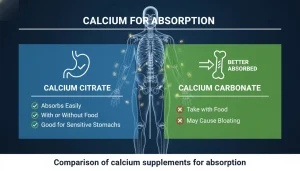Choosing the right supplement for bone health can be confusing. There are hundreds of products claiming to be the best calcium supplement — some promise stronger bones, others say they’re easier to digest, and a few come in fancy chewable forms that taste like candy.
After treating thousands of patients (and testing more bottles than I’d like to admit), I’ve learned one key lesson: the best calcium supplement is the one you’ll actually take every single day.
That might sound obvious, but it’s true. The right product depends on your body, your habits, and yes — your stomach. Let’s make sense of it all.
Why Calcium Matters So Much

Calcium is not just about bones. This essential mineral helps muscles contract, nerves send signals, and blood clot properly. When your body doesn’t get enough through food, it “borrows” from your bones — and that’s when weakness, fractures, and osteoporosis start creeping in.
If you’ve ever been told to increase your calcium intake, it’s because your bones act like a savings account. You deposit calcium during youth and withdraw it as you age. Unfortunately, many adults don’t make enough deposits.
That’s where the right bone-strengthening supplement comes in.
Different Types of Calcium-Based Products

Not all forms of this mineral are created equal. Each type varies in how easily your body can absorb it and how well your stomach tolerates it.
- Calcium Carbonate — The Budget-Friendly Classic
This is the most common and affordable form, found in brands like Tums, Caltrate, and Os-Cal. It offers a high dose of elemental calcium per pill — about 40%.
However, it needs stomach acid for proper absorption, which means it’s best taken with meals. For those who take acid-reducing medication, absorption might drop. Some users also complain of bloating or constipation, which can make this form less appealing.
- Calcium Citrate — The Easygoing Option
If you want something gentle, this one’s for you. Calcium citrate doesn’t need stomach acid to be absorbed, so it can be taken with or without food.
It’s slightly more expensive, and the tablets are larger, but it tends to be easier on the digestive system. I recommend this form most often to my patients, especially those with sensitive stomachs or absorption issues.
- Other Forms — The Less Common Choices
Calcium lactate, gluconate, and tricalcium phosphate are sometimes available, but they contain smaller amounts of calcium per pill. That means you’d need to take more tablets to get the same benefit — not ideal for daily use.
Plant-Based and “Natural” Supplements — Worth It?
Products like AlgaeCal promote themselves as natural, plant-derived options. They contain calcium carbonate sourced from marine algae, along with trace minerals such as magnesium and boron.
Are they better? Not necessarily. While the mineral content is fine, research hasn’t shown them to outperform traditional options. If you prefer a plant-based lifestyle or find them easier to digest, go ahead — just don’t expect a miracle difference.
For most users, standard calcium citrate remains a reliable, proven choice.
Common Side Effects and How to Prevent Them
Many people experience digestive discomfort when they start supplementing — bloating, gas, or constipation being the usual suspects.
Here’s what helps:
- Choose calcium citrate if your stomach is sensitive.
- Drink more water — hydration helps your gut move things along.
- Spread doses out — large single doses are harder to tolerate.
- Add magnesium (through food or supplements) to balance digestion.
A lighthearted truth: I’ve had patients joke that calcium “builds bones but blocks traffic.” Fortunately, small adjustments fix that problem fast.
How to Choose the Right Supplement for You
When picking a product, focus on these five key points:
- Form – Pick what your body tolerates best.
- Serving size – Read the label carefully; “500 mg per serving” might mean two tablets, not one.
- Additives – Avoid products with too much sugar or unnecessary fillers.
- Ease of use – If the pills are huge, consider chewables or gummies.
- Consistency – Choose something you won’t forget to take.
You can also get calcium from your diet — milk, yogurt, cheese, spinach, tofu, and salmon are excellent sources. Supplements fill the gaps; they don’t replace a healthy plate.
Timing and Absorption Tips
Your body can only absorb about 500 mg of calcium at a time, so splitting your dose is best — once in the morning, once at night.
- Calcium carbonate: Take with food.
- Calcium citrate: Anytime works fine.
If you’re taking thyroid medication or antibiotics, leave a 3–4 hour gap between them and your supplement. Otherwise, the mineral might block your medicine’s absorption.
And yes, vitamin D matters a lot — it acts like the key that unlocks calcium’s door into your bones. You can get it from sunlight, fortified foods, or supplements. For more on this, see how vitamin D supports calcium absorption.
Cost vs. Quality — What Really Matters
Higher price doesn’t always mean higher quality. A well-formulated store brand can work just as well as a premium label.
Here’s my rule:
- If you tolerate it well and your lab results look good — keep using it.
- If it upsets your stomach or you forget doses, try something easier.
Think of it like coffee — if the cheaper one tastes awful, you’ll end up buying the one that feels right for you.
Mistakes to Avoid When Taking Bone Supplements
- Taking all your calcium at once – reduces absorption.
- Ignoring your diet – natural sources still matter.
- Mixing it with conflicting medications – always check timing.
- Skipping vitamin D – without it, calcium can’t do its job.
- Falling for marketing hype – fancy labels don’t build stronger bones.
Frequently Asked Questions (FAQ)
- What’s the easiest form to digest?
Calcium citrate is generally the gentlest option. It’s absorbed well and causes fewer stomach issues than other forms.
- Can I take it with vitamin D or magnesium?
Yes! In fact, combining them can help your body use these nutrients more effectively. Many supplements include both in one formula.
- Is it okay to take it before bed?
Absolutely. Taking it at night can work well since your body repairs bone tissue while you sleep.
- Do gummies and chewables work?
They do — as long as you take enough to reach your target daily dose. Just check the label; many contain less calcium than tablets.
- Can too much calcium cause problems?
Yes. Excess intake (over 2000–2500 mg daily) can lead to kidney stones or interfere with other minerals. Always stay within recommended limits.
- Are natural or algae-based versions better?
They’re fine options, especially for vegetarians, but they’re not necessarily more effective. The main factor is still how consistently you take them.
- Should I rely on food or supplements?
Ideally, get most of your calcium from food and use supplements to fill the gap. Whole foods offer other nutrients — protein, magnesium, phosphorus — that all help strengthen bone tissue.
Final Thoughts — Keep It Practical
If there’s one message I give all my patients, it’s this: simplicity works. Don’t get lost in marketing terms or endless product comparisons.
Choose a form your stomach likes, take it regularly, and pair it with vitamin D. Whether it’s a small white tablet or a chewable gummy, what matters most is consistency.
Your bones don’t care about brand names — they care about steady, reliable nutrition.
And remember, the real “best calcium supplement” is the one that fits into your life with ease and helps you stay strong for years to come.
